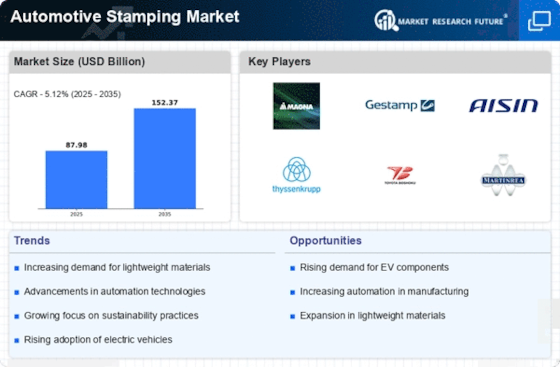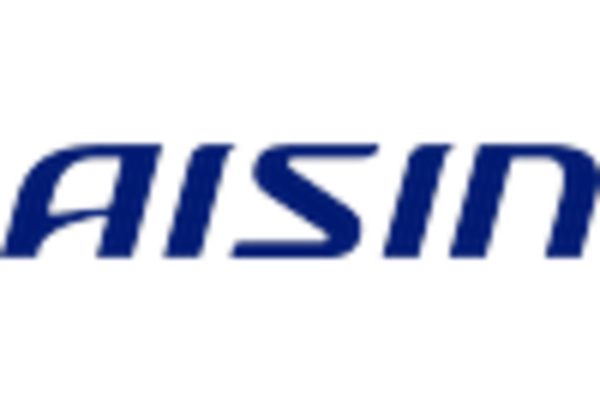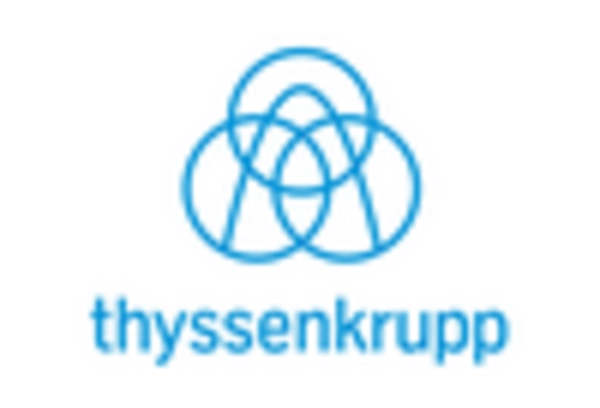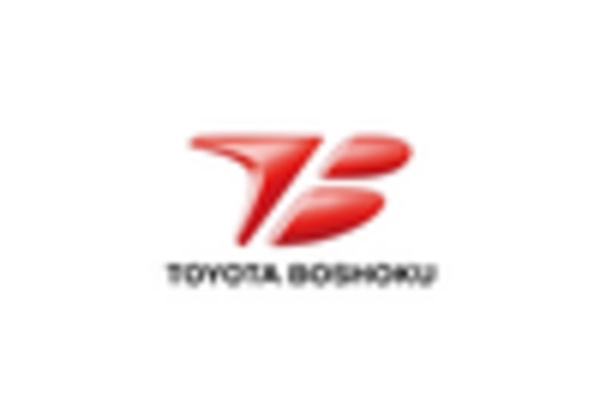Global Automotive Stamping Market- Stamping Type Outlook (USD Billion, 2019-2032)
- Hot Metal Stamping
- Cold Metal Stamping
Global Automotive Stamping Market- Method Outlook (USD Billion, 2019-2032)
- Progressive Die stamping
- Transfer Die Stamping
- Others
Global Automotive Stamping Market- Material Outlook (USD Billion, 2019-2032)
- Copper
- Aluminum
- Steel
- Others
Global Automotive Stamping Market- Component Outlook (USD Billion, 2019-2032)
- Chassis
- Engine
- Transmission System
- Body
- Electrification & Mechatronics
Global Automotive Stamping Market- Vehicle Type Outlook (USD Billion, 2019-2032)
- Passenger Cars
- Commercial Vehicles
- Offroad Vehicles
- Two Wheelers
- Others
Global Automotive Stamping Market- Vehicle Category Outlook (USD Billion, 2019-2032)
Global Automotive Stamping Market- End User Outlook (USD Billion, 2019-2032)
- OEM
- Tier Automotive Manufacturer
- North America Outlook (USD Billion, 2019-2032)
North America Automotive Stamping Market- Stamping Type Outlook (USD Billion, 2019-2032)
- Hot Metal Stamping
- Cold Metal Stamping
North America Automotive Stamping Market- Method Outlook (USD Billion, 2019-2032)
- Progressive Die stamping
- Transfer Die Stamping
- Others
North America Automotive Stamping Market- Material Outlook (USD Billion, 2019-2032)
- Copper
- Aluminum
- Steel
- Others
North America Automotive Stamping Market- Component Outlook (USD Billion, 2019-2032)
- Chassis
- Engine
- Transmission System
- Body
- Electrification & Mechatronics
North America Automotive Stamping Market- Vehicle Type Outlook (USD Billion, 2019-2032)
- Passenger Cars
- Commercial Vehicles
- Offroad Vehicles
- Two Wheelers
- Others
North America Automotive Stamping Market- Vehicle Category Outlook (USD Billion, 2019-2032)
North America Automotive Stamping Market- End User Outlook (USD Billion, 2019-2032)
- OEM
- Tier Automotive Manufacturer
- US Outlook (USD Billion, 2019-2032)
US Automotive Stamping Market- Stamping Type Outlook (USD Billion, 2019-2032)
- Hot Metal Stamping
- Cold Metal Stamping
US Automotive Stamping Market- Method Outlook (USD Billion, 2019-2032)
- Progressive Die stamping
- Transfer Die Stamping
- Others
US Automotive Stamping Market- Material Outlook (USD Billion, 2019-2032)
- Copper
- Aluminum
- Steel
- Others
US Automotive Stamping Market- Component Outlook (USD Billion, 2019-2032)
- Chassis
- Engine
- Transmission System
- Body
- Electrification & Mechatronics
US Automotive Stamping Market- Vehicle Type Outlook (USD Billion, 2019-2032)
- Passenger Cars
- Commercial Vehicles
- Offroad Vehicles
- Two Wheelers
- Others
US Automotive Stamping Market- Vehicle Category Outlook (USD Billion, 2019-2032)
US Automotive Stamping Market- End User Outlook (USD Billion, 2019-2032)
- OEM
- Tier Automotive Manufacturer
- Canada Outlook (USD Billion, 2019-2032)
Canada Automotive Stamping Market- Stamping Type Outlook (USD Billion, 2019-2032)
- Hot Metal Stamping
- Cold Metal Stamping
Canada Automotive Stamping Market- Method Outlook (USD Billion, 2019-2032)
- Progressive Die stamping
- Transfer Die Stamping
- Others
Canada Automotive Stamping Market- Material Outlook (USD Billion, 2019-2032)
- Copper
- Aluminum
- Steel
- Others
Canada Automotive Stamping Market- Component Outlook (USD Billion, 2019-2032)
- Chassis
- Engine
- Transmission System
- Body
- Electrification & Mechatronics
Canada Automotive Stamping Market- Vehicle Type Outlook (USD Billion, 2019-2032)
- Passenger Cars
- Commercial Vehicles
- Offroad Vehicles
- Two Wheelers
- Others
Canada Automotive Stamping Market- Vehicle Category Outlook (USD Billion, 2019-2032)
Canada Automotive Stamping Market- End User Outlook (USD Billion, 2019-2032)
- OEM
- Tier Automotive Manufacturer
- Mexico Outlook (USD Billion, 2019-2032)
Mexico Automotive Stamping Market- Stamping Type Outlook (USD Billion, 2019-2032)
- Hot Metal Stamping
- Cold Metal Stamping
Mexico Automotive Stamping Market- Method Outlook (USD Billion, 2019-2032)
- Progressive Die stamping
- Transfer Die Stamping
- Others
Mexico Automotive Stamping Market- Material Outlook (USD Billion, 2019-2032)
- Copper
- Aluminum
- Steel
- Others
Mexico Automotive Stamping Market- Component Outlook (USD Billion, 2019-2032)
- Chassis
- Engine
- Transmission System
- Body
- Electrification & Mechatronics
Mexico Automotive Stamping Market- Vehicle Type Outlook (USD Billion, 2019-2032)
- Passenger Cars
- Commercial Vehicles
- Offroad Vehicles
- Two Wheelers
- Others
Mexico Automotive Stamping Market- Vehicle Category Outlook (USD Billion, 2019-2032)
Mexico Automotive Stamping Market- End User Outlook (USD Billion, 2019-2032)
- OEM
- Tier Automotive Manufacturer
- Europe Outlook (USD Billion, 2019-2032)
Europe Automotive Stamping Market- Stamping Type Outlook (USD Billion, 2019-2032)
- Hot Metal Stamping
- Cold Metal Stamping
Europe Automotive Stamping Market- Method Outlook (USD Billion, 2019-2032)
- Progressive Die stamping
- Transfer Die Stamping
- Others
Europe Automotive Stamping Market- Material Outlook (USD Billion, 2019-2032)
- Copper
- Aluminum
- Steel
- Others
Europe Automotive Stamping Market- Component Outlook (USD Billion, 2019-2032)
- Chassis
- Engine
- Transmission System
- Body
- Electrification & Mechatronics
Europe Automotive Stamping Market- Vehicle Type Outlook (USD Billion, 2019-2032)
- Passenger Cars
- Commercial Vehicles
- Offroad Vehicles
- Two Wheelers
- Others
Europe Automotive Stamping Market- Vehicle Category Outlook (USD Billion, 2019-2032)
Europe Automotive Stamping Market- End User Outlook (USD Billion, 2019-2032)
- OEM
- Tier Automotive Manufacturer
- Germany Outlook (USD Billion, 2019-2032)
Germany Automotive Stamping Market- Stamping Type Outlook (USD Billion, 2019-2032)
- Hot Metal Stamping
- Cold Metal Stamping
Germany Automotive Stamping Market- Method Outlook (USD Billion, 2019-2032)
- Progressive Die stamping
- Transfer Die Stamping
- Others
Germany Automotive Stamping Market- Material Outlook (USD Billion, 2019-2032)
- Copper
- Aluminum
- Steel
- Others
Germany Automotive Stamping Market- Component Outlook (USD Billion, 2019-2032)
- Chassis
- Engine
- Transmission System
- Body
- Electrification & Mechatronics
Germany Automotive Stamping Market- Vehicle Type Outlook (USD Billion, 2019-2032)
- Passenger Cars
- Commercial Vehicles
- Offroad Vehicles
- Two Wheelers
- Others
Germany Automotive Stamping Market- Vehicle Category Outlook (USD Billion, 2019-2032)
Germany Automotive Stamping Market- End User Outlook (USD Billion, 2019-2032)
- OEM
- Tier Automotive Manufacturer
- Denmark Outlook (USD Billion, 2019-2032)
Denmark Automotive Stamping Market- Stamping Type Outlook (USD Billion, 2019-2032)
- Hot Metal Stamping
- Cold Metal Stamping
Denmark Automotive Stamping Market- Method Outlook (USD Billion, 2019-2032)
- Progressive Die stamping
- Transfer Die Stamping
- Others
Denmark Automotive Stamping Market- Material Outlook (USD Billion, 2019-2032)
- Copper
- Aluminum
- Steel
- Others
Denmark Automotive Stamping Market- Component Outlook (USD Billion, 2019-2032)
- Chassis
- Engine
- Transmission System
- Body
- Electrification & Mechatronics
Denmark Automotive Stamping Market- Vehicle Type Outlook (USD Billion, 2019-2032)
- Passenger Cars
- Commercial Vehicles
- Offroad Vehicles
- Two Wheelers
- Others
Denmark Automotive Stamping Market- Vehicle Category Outlook (USD Billion, 2019-2032)
Denmark Automotive Stamping Market- End User Outlook (USD Billion, 2019-2032)
- OEM
- Tier Automotive Manufacturer
- UK Outlook (USD Billion, 2019-2032)
UK Automotive Stamping Market- Stamping Type Outlook (USD Billion, 2019-2032)
- Hot Metal Stamping
- Cold Metal Stamping
UK Automotive Stamping Market- Method Outlook (USD Billion, 2019-2032)
- Progressive Die stamping
- Transfer Die Stamping
- Others
UK Automotive Stamping Market- Material Outlook (USD Billion, 2019-2032)
- Copper
- Aluminum
- Steel
- Others
UK Automotive Stamping Market- Component Outlook (USD Billion, 2019-2032)
- Chassis
- Engine
- Transmission System
- Body
- Electrification & Mechatronics
UK Automotive Stamping Market- Vehicle Type Outlook (USD Billion, 2019-2032)
- Passenger Cars
- Commercial Vehicles
- Offroad Vehicles
- Two Wheelers
- Others
UK Automotive Stamping Market- Vehicle Category Outlook (USD Billion, 2019-2032)
UK Automotive Stamping Market- End User Outlook (USD Billion, 2019-2032)
- OEM
- Tier Automotive Manufacturer
- Italy Outlook (USD Billion, 2019-2032)
Italy Automotive Stamping Market- Stamping Type Outlook (USD Billion, 2019-2032)
- Hot Metal Stamping
- Cold Metal Stamping
Italy Automotive Stamping Market- Method Outlook (USD Billion, 2019-2032)
- Progressive Die stamping
- Transfer Die Stamping
- Others
Italy Automotive Stamping Market- Material Outlook (USD Billion, 2019-2032)
- Copper
- Aluminum
- Steel
- Others
Italy Automotive Stamping Market- Component Outlook (USD Billion, 2019-2032)
- Chassis
- Engine
- Transmission System
- Body
- Electrification & Mechatronics
Italy Automotive Stamping Market- Vehicle Type Outlook (USD Billion, 2019-2032)
- Passenger Cars
- Commercial Vehicles
- Offroad Vehicles
- Two Wheelers
- Others
Italy Automotive Stamping Market- Vehicle Category Outlook (USD Billion, 2019-2032)
Italy Automotive Stamping Market- End User Outlook (USD Billion, 2019-2032)
- OEM
- Tier Automotive Manufacturer
- Rest of Europe Outlook (USD Billion, 2019-2032)
Rest of Europe Automotive Stamping Market- Stamping Type Outlook (USD Billion, 2019-2032)
- Hot Metal Stamping
- Cold Metal Stamping
Rest of Europe Automotive Stamping Market- Method Outlook (USD Billion, 2019-2032)
- Progressive Die stamping
- Transfer Die Stamping
- Others
Rest of Europe Automotive Stamping Market- Material Outlook (USD Billion, 2019-2032)
- Copper
- Aluminum
- Steel
- Others
Rest of Europe Automotive Stamping Market- Component Outlook (USD Billion, 2019-2032)
- Chassis
- Engine
- Transmission System
- Body
- Electrification & Mechatronics
Rest of Europe Automotive Stamping Market- Vehicle Type Outlook (USD Billion, 2019-2032)
- Passenger Cars
- Commercial Vehicles
- Offroad Vehicles
- Two Wheelers
- Others
Rest of Europe Automotive Stamping Market- Vehicle Category Outlook (USD Billion, 2019-2032)
Rest of Europe Automotive Stamping Market- End User Outlook (USD Billion, 2019-2032)
- OEM
- Tier Automotive Manufacturer
- Asia-Pacific Outlook (USD Billion, 2019-2032)
Asia-Pacific Automotive Stamping Market- Stamping Type Outlook (USD Billion, 2019-2032)
- Hot Metal Stamping
- Cold Metal Stamping
Asia-Pacific Automotive Stamping Market- Method Outlook (USD Billion, 2019-2032)
- Progressive Die stamping
- Transfer Die Stamping
- Others
Asia-Pacific Automotive Stamping Market- Material Outlook (USD Billion, 2019-2032)
- Copper
- Aluminum
- Steel
- Others
Asia-Pacific Automotive Stamping Market- Component Outlook (USD Billion, 2019-2032)
- Chassis
- Engine
- Transmission System
- Body
- Electrification & Mechatronics
Asia-Pacific Automotive Stamping Market- Vehicle Type Outlook (USD Billion, 2019-2032)
- Passenger Cars
- Commercial Vehicles
- Offroad Vehicles
- Two Wheelers
- Others
Asia-Pacific Automotive Stamping Market- Vehicle Category Outlook (USD Billion, 2019-2032)
Asia-Pacific Automotive Stamping Market- End User Outlook (USD Billion, 2019-2032)
- OEM
- Tier Automotive Manufacturer
- India Outlook (USD Billion, 2019-2032)
India Automotive Stamping Market- Stamping Type Outlook (USD Billion, 2019-2032)
- Hot Metal Stamping
- Cold Metal Stamping
India Automotive Stamping Market- Method Outlook (USD Billion, 2019-2032)
- Progressive Die stamping
- Transfer Die Stamping
- Others
India Automotive Stamping Market- Material Outlook (USD Billion, 2019-2032)
- Copper
- Aluminum
- Steel
- Others
India Automotive Stamping Market- Component Outlook (USD Billion, 2019-2032)
- Chassis
- Engine
- Transmission System
- Body
- Electrification & Mechatronics
India Automotive Stamping Market- Vehicle Type Outlook (USD Billion, 2019-2032)
- Passenger Cars
- Commercial Vehicles
- Offroad Vehicles
- Two Wheelers
- Others
India Automotive Stamping Market- Vehicle Category Outlook (USD Billion, 2019-2032)
India Automotive Stamping Market- End User Outlook (USD Billion, 2019-2032)
- OEM
- Tier Automotive Manufacturer
- China Outlook (USD Billion, 2019-2032)
China Automotive Stamping Market- Stamping Type Outlook (USD Billion, 2019-2032)
- Hot Metal Stamping
- Cold Metal Stamping
China Automotive Stamping Market- Method Outlook (USD Billion, 2019-2032)
- Progressive Die stamping
- Transfer Die Stamping
- Others
China Automotive Stamping Market- Material Outlook (USD Billion, 2019-2032)
- Copper
- Aluminum
- Steel
- Others
China Automotive Stamping Market- Component Outlook (USD Billion, 2019-2032)
- Chassis
- Engine
- Transmission System
- Body
- Electrification & Mechatronics
China Automotive Stamping Market- Vehicle Type Outlook (USD Billion, 2019-2032)
- Passenger Cars
- Commercial Vehicles
- Offroad Vehicles
- Two Wheelers
- Others
China Automotive Stamping Market- Vehicle Category Outlook (USD Billion, 2019-2032)
China Automotive Stamping Market- End User Outlook (USD Billion, 2019-2032)
- OEM
- Tier Automotive Manufacturer
- Japan Outlook (USD Billion, 2019-2032)
Japan Automotive Stamping Market- Stamping Type Outlook (USD Billion, 2019-2032)
- Hot Metal Stamping
- Cold Metal Stamping
Japan Automotive Stamping Market- Method Outlook (USD Billion, 2019-2032)
- Progressive Die stamping
- Transfer Die Stamping
- Others
Japan Automotive Stamping Market- Material Outlook (USD Billion, 2019-2032)
- Copper
- Aluminum
- Steel
- Others
Japan Automotive Stamping Market- Component Outlook (USD Billion, 2019-2032)
- Chassis
- Engine
- Transmission System
- Body
- Electrification & Mechatronics
Japan Automotive Stamping Market- Vehicle Type Outlook (USD Billion, 2019-2032)
- Passenger Cars
- Commercial Vehicles
- Offroad Vehicles
- Two Wheelers
- Others
Japan Automotive Stamping Market- Vehicle Category Outlook (USD Billion, 2019-2032)
Japan Automotive Stamping Market- End User Outlook (USD Billion, 2019-2032)
- OEM
- Tier Automotive Manufacturer
- Australia Outlook (USD Billion, 2019-2032)
Australia Automotive Stamping Market- Stamping Type Outlook (USD Billion, 2019-2032)
- Hot Metal Stamping
- Cold Metal Stamping
Australia Automotive Stamping Market- Method Outlook (USD Billion, 2019-2032)
- Progressive Die stamping
- Transfer Die Stamping
- Others
Australia Automotive Stamping Market- Material Outlook (USD Billion, 2019-2032)
- Copper
- Aluminum
- Steel
- Others
Australia Automotive Stamping Market- Component Outlook (USD Billion, 2019-2032)
- Chassis
- Engine
- Transmission System
- Body
- Electrification & Mechatronics
Australia Automotive Stamping Market- Vehicle Type Outlook (USD Billion, 2019-2032)
- Passenger Cars
- Commercial Vehicles
- Offroad Vehicles
- Two Wheelers
- Others
Australia Automotive Stamping Market- Vehicle Category Outlook (USD Billion, 2019-2032)
Australia Automotive Stamping Market- End User Outlook (USD Billion, 2019-2032)
- OEM
- Tier Automotive Manufacturer
- Rest of Asia-Pacific Outlook (USD Billion, 2019-2032)
Rest of Asia-Pacific Automotive Stamping Market- Stamping Type Outlook (USD Billion, 2019-2032)
- Hot Metal Stamping
- Cold Metal Stamping
Rest of Asia-Pacific Automotive Stamping Market- Method Outlook (USD Billion, 2019-2032)
- Progressive Die stamping
- Transfer Die Stamping
- Others
Rest of Asia-Pacific Automotive Stamping Market- Material Outlook (USD Billion, 2019-2032)
- Copper
- Aluminum
- Steel
- Others
Rest of Asia-Pacific Automotive Stamping Market- Component Outlook (USD Billion, 2019-2032)
- Chassis
- Engine
- Transmission System
- Body
- Electrification & Mechatronics
Rest of Asia-Pacific Automotive Stamping Market- Vehicle Type Outlook (USD Billion, 2019-2032)
- Passenger Cars
- Commercial Vehicles
- Offroad Vehicles
- Two Wheelers
- Others
Rest of Asia-Pacific Automotive Stamping Market- Vehicle Category Outlook (USD Billion, 2019-2032)
Rest of Asia-Pacific Automotive Stamping Market- End User Outlook (USD Billion, 2019-2032)
- OEM
- Tier Automotive Manufacturer
- Middle East & Africa Outlook (USD Billion, 2019-2032)
Middle East and Africa Automotive Stamping Market- Stamping Type Outlook (USD Billion, 2019-2032)
- Hot Metal Stamping
- Cold Metal Stamping
Middle East and Africa Automotive Stamping Market- Method Outlook (USD Billion, 2019-2032)
- Progressive Die stamping
- Transfer Die Stamping
- Others
Middle East and Africa Automotive Stamping Market- Material Outlook (USD Billion, 2019-2032)
- Copper
- Aluminum
- Steel
- Others
Middle East and Africa Automotive Stamping Market- Component Outlook (USD Billion, 2019-2032)
- Chassis
- Engine
- Transmission System
- Body
- Electrification & Mechatronics
Middle East and Africa Automotive Stamping Market- Vehicle Type Outlook (USD Billion, 2019-2032)
- Passenger Cars
- Commercial Vehicles
- Offroad Vehicles
- Two Wheelers
- Others
Middle East and Africa Automotive Stamping Market- Vehicle Category Outlook (USD Billion, 2019-2032)
Middle East and Africa Automotive Stamping Market- End User Outlook (USD Billion, 2019-2032)
- OEM
- Tier Automotive Manufacturer
- Saudi Arabia Outlook (USD Billion, 2019-2032)
Saudi Arabia Automotive Stamping Market- Stamping Type Outlook (USD Billion, 2019-2032)
- Hot Metal Stamping
- Cold Metal Stamping
Saudi Arabia Automotive Stamping Market- Method Outlook (USD Billion, 2019-2032)
- Progressive Die stamping
- Transfer Die Stamping
- Others
Saudi Arabia Automotive Stamping Market- Material Outlook (USD Billion, 2019-2032)
- Copper
- Aluminum
- Steel
- Others
Saudi Arabia Automotive Stamping Market- Component Outlook (USD Billion, 2019-2032)
- Chassis
- Engine
- Transmission System
- Body
- Electrification & Mechatronics
Saudi Arabia Automotive Stamping Market- Vehicle Type Outlook (USD Billion, 2019-2032)
- Passenger Cars
- Commercial Vehicles
- Offroad Vehicles
- Two Wheelers
- Others
Saudi Arabia Automotive Stamping Market- Vehicle Category Outlook (USD Billion, 2019-2032)
Saudi Arabia Automotive Stamping Market- End User Outlook (USD Billion, 2019-2032)
- OEM
- Tier Automotive Manufacturer
- UAE Outlook (USD Billion, 2019-2032)
UAE Automotive Stamping Market- Stamping Type Outlook (USD Billion, 2019-2032)
- Hot Metal Stamping
- Cold Metal Stamping
UAE Automotive Stamping Market- Method Outlook (USD Billion, 2019-2032)
- Progressive Die stamping
- Transfer Die Stamping
- Others
UAE Automotive Stamping Market- Material Outlook (USD Billion, 2019-2032)
- Copper
- Aluminum
- Steel
- Others
UAE Automotive Stamping Market- Component Outlook (USD Billion, 2019-2032)
- Chassis
- Engine
- Transmission System
- Body
- Electrification & Mechatronics
UAE Automotive Stamping Market- Vehicle Type Outlook (USD Billion, 2019-2032)
- Passenger Cars
- Commercial Vehicles
- Offroad Vehicles
- Two Wheelers
- Others
UAE Automotive Stamping Market- Vehicle Category Outlook (USD Billion, 2019-2032)
UAE Automotive Stamping Market- End User Outlook (USD Billion, 2019-2032)
- OEM
- Tier Automotive Manufacturer
- South Africa Outlook (USD Billion, 2019-2032)
South Africa Automotive Stamping Market- Stamping Type Outlook (USD Billion, 2019-2032)
- Hot Metal Stamping
- Cold Metal Stamping
South Africa Automotive Stamping Market- Method Outlook (USD Billion, 2019-2032)
- Progressive Die stamping
- Transfer Die Stamping
- Others
South Africa Automotive Stamping Market- Material Outlook (USD Billion, 2019-2032)
- Copper
- Aluminum
- Steel
- Others
South Africa Automotive Stamping Market- Component Outlook (USD Billion, 2019-2032)
- Chassis
- Engine
- Transmission System
- Body
- Electrification & Mechatronics
South Africa Automotive Stamping Market- Vehicle Type Outlook (USD Billion, 2019-2032)
- Passenger Cars
- Commercial Vehicles
- Offroad Vehicles
- Two Wheelers
- Others
South Africa Automotive Stamping Market- Vehicle Category Outlook (USD Billion, 2019-2032)
South Africa Automotive Stamping Market- End User Outlook (USD Billion, 2019-2032)
- OEM
- Tier Automotive Manufacturer
- Rest of Middle East and Africa Outlook (USD Billion, 2019-2032)
Rest of Middle East and Africa Automotive Stamping Market- Stamping Type Outlook (USD Billion, 2019-2032)
- Hot Metal Stamping
- Cold Metal Stamping
Rest of Middle East and Africa Automotive Stamping Market- Method Outlook (USD Billion, 2019-2032)
- Progressive Die stamping
- Transfer Die Stamping
- Others
Rest of Middle East and Africa Automotive Stamping Market- Material Outlook (USD Billion, 2019-2032)
- Copper
- Aluminum
- Steel
- Others
Rest of Middle East and Africa Automotive Stamping Market- Component Outlook (USD Billion, 2019-2032)
- Chassis
- Engine
- Transmission System
- Body
- Electrification & Mechatronics
Rest of Middle East and Africa Automotive Stamping Market- Vehicle Type Outlook (USD Billion, 2019-2032)
- Passenger Cars
- Commercial Vehicles
- Offroad Vehicles
- Two Wheelers
- Others
Rest of Middle East and Africa Automotive Stamping Market- Vehicle Category Outlook (USD Billion, 2019-2032)
Rest of Middle East and Africa Automotive Stamping Market- End User Outlook (USD Billion, 2019-2032)
- OEM
- Tier Automotive Manufacturer
- South America Outlook (USD Billion, 2019-2032)
South America Automotive Stamping Market- Stamping Type Outlook (USD Billion, 2019-2032)
- Hot Metal Stamping
- Cold Metal Stamping
South America Automotive Stamping Market- Method Outlook (USD Billion, 2019-2032)
- Progressive Die stamping
- Transfer Die Stamping
- Others
South America Automotive Stamping Market- Material Outlook (USD Billion, 2019-2032)
- Copper
- Aluminum
- Steel
- Others
South America Automotive Stamping Market- Component Outlook (USD Billion, 2019-2032)
- Chassis
- Engine
- Transmission System
- Body
- Electrification & Mechatronics
South America Automotive Stamping Market- Vehicle Type Outlook (USD Billion, 2019-2032)
- Passenger Cars
- Commercial Vehicles
- Offroad Vehicles
- Two Wheelers
- Others
South America Automotive Stamping Market- Vehicle Category Outlook (USD Billion, 2019-2032)
South America Automotive Stamping Market- End User Outlook (USD Billion, 2019-2032)
- OEM
- Tier Automotive Manufacturer
- Brazil Outlook (USD Billion, 2019-2032)
Brazil Automotive Stamping Market- Stamping Type Outlook (USD Billion, 2019-2032)
- Hot Metal Stamping
- Cold Metal Stamping
Brazil Automotive Stamping Market- Method Outlook (USD Billion, 2019-2032)
- Progressive Die stamping
- Transfer Die Stamping
- Others
Brazil Automotive Stamping Market- Material Outlook (USD Billion, 2019-2032)
- Copper
- Aluminum
- Steel
- Others
Brazil Automotive Stamping Market- Component Outlook (USD Billion, 2019-2032)
- Chassis
- Engine
- Transmission System
- Body
- Electrification & Mechatronics
Brazil Automotive Stamping Market- Vehicle Type Outlook (USD Billion, 2019-2032)
- Passenger Cars
- Commercial Vehicles
- Offroad Vehicles
- Two Wheelers
- Others
Brazil Automotive Stamping Market- Vehicle Category Outlook (USD Billion, 2019-2032)
Brazil Automotive Stamping Market- End User Outlook (USD Billion, 2019-2032)
- OEM
- Tier Automotive Manufacturer
- Argentina Outlook (USD Billion, 2019-2032)
Argentina Automotive Stamping Market- Stamping Type Outlook (USD Billion, 2019-2032)
- Hot Metal Stamping
- Cold Metal Stamping
Argentina Automotive Stamping Market- Method Outlook (USD Billion, 2019-2032)
- Progressive Die stamping
- Transfer Die Stamping
- Others
Argentina Automotive Stamping Market- Material Outlook (USD Billion, 2019-2032)
- Copper
- Aluminum
- Steel
- Others
Argentina Automotive Stamping Market- Component Outlook (USD Billion, 2019-2032)
- Chassis
- Engine
- Transmission System
- Body
- Electrification & Mechatronics
Argentina Automotive Stamping Market- Vehicle Type Outlook (USD Billion, 2019-2032)
- Passenger Cars
- Commercial Vehicles
- Offroad Vehicles
- Two Wheelers
- Others
Argentina Automotive Stamping Market- Vehicle Category Outlook (USD Billion, 2019-2032)
Argentina Automotive Stamping Market- End User Outlook (USD Billion, 2019-2032)
- OEM
- Tier Automotive Manufacturer
- Rest of South America Outlook (USD Billion, 2019-2032)
Rest of South America Automotive Stamping Market- Stamping Type Outlook (USD Billion, 2019-2032)
- Hot Metal Stamping
- Cold Metal Stamping
Rest of South America Automotive Stamping Market- Method Outlook (USD Billion, 2019-2032)
- Progressive Die stamping
- Transfer Die Stamping
- Others
Rest of South America Automotive Stamping Market- Material Outlook (USD Billion, 2019-2032)
- Copper
- Aluminum
- Steel
- Others
Rest of South America Automotive Stamping Market- Component Outlook (USD Billion, 2019-2032)
- Chassis
- Engine
- Transmission System
- Body
- Electrification & Mechatronics
Rest of South America Automotive Stamping Market- Vehicle Type Outlook (USD Billion, 2019-2032)
- Passenger Cars
- Commercial Vehicles
- Offroad Vehicles
- Two Wheelers
- Others
Rest of South America Automotive Stamping Market- Vehicle Category Outlook (USD Billion, 2019-2032)
Rest of South America Automotive Stamping Market- End User Outlook (USD Billion, 2019-2032)
- OEM
- Tier Automotive Manufacturer


















Leave a Comment